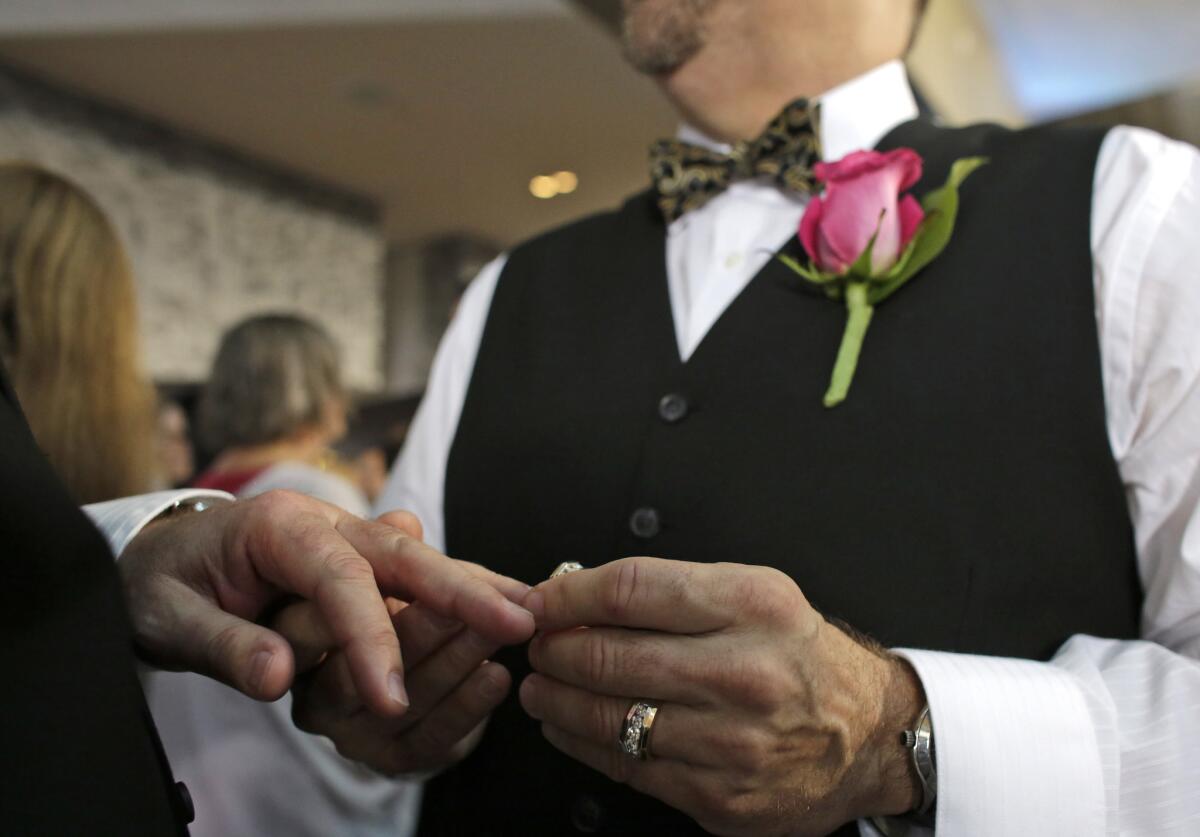Popping the question: Which GOP candidates would go to a gay wedding?

Steve Visano, 54, places a ring on his partner’s hand during a group wedding ceremony in Fort Lauderdale, Fla. Republican presidential hopefuls have been asked whether they would attend a gay wedding. Some said they would, some not; still others avoided a direct reply.
Reporting from Washington — When it comes to attending a gay wedding, not all presidential aspirants say “I do.”
It sounded at first like a simple, if unusual, question to ask a potential leader of the free world: Would you go to a same-sex wedding?
But it is fast becoming a kind of conservative litmus test for potential GOP presidential candidates.
Most Republican hopefuls stand squarely in the traditional camp of defining marriage as between a man and a woman, and they oppose efforts, such as the one looming before the Supreme Court, to legalize same-sex marriage nationwide.
They differ, however, on whether they would personally attend the wedding of a gay friend or family member.
The question was first posed this week to Sen. Marco Rubio, the Florida Republican, after the 43-year-old launched his presidential campaign as the party’s face of a new generation.
“If it’s somebody in my life that I care for, of course I would,” Rubio told Jorge Ramos of the Fusion cable TV channel.
“I’m not going to hurt them simply because I disagree with a choice they’ve made,” he said. “You respect that because you love them.”
Not so fast, said former Republican Sen. Rick Santorum. The Catholic evangelical, who hopes his conservative values will attract a wide following if he jumps into the race, drew the line at celebrating gay marriages.
“No, I would not,” Santorum told radio host Hugh Hewitt. “That would be something that would be a violation of my faith. I would love them and support them, but I would not participate in that ceremony.”
Sen. Ted Cruz (R-Texas) seemed to wriggle out of the question, saying he had not yet been invited to any gay weddings so had not considered whether he would attend such a bash.
“Well, I will tell you, I haven’t faced that circumstance,” Cruz told Hewitt, blaming the media for muddying what he called a straightforward constitutional question over marriage.
“They routinely say, ‘Well, gosh, any conservative must hate people who are gay.’ And as you know, that has nothing to do with the operative legal question,” said Cruz, a former Texas solicitor general. “Marriage has been a question for the states.”
Public attitudes toward gay marriage have been among the most rapidly changing of any social issue in modern times as polls show voters have essentially flipped in recent years to support it.
As recently as 2009, 54% of Americans opposed same-sex marriage, according to Pew Research, with 37% in favor. Today support is broaching 60%, in some surveys.
The swift and unexpected shift has forced Democratic and Republican candidates to scramble to adjust — or evolve, as many say — with the times.
President Obama acknowledged his own evolution on the issue and now supports same-sex marriage. A spokeswoman for the Democratic front-runner, Hillary Rodham Clinton, said Thursday the former secretary of State would like to see the Supreme Court clear the way for same-sex couples to marry.
Younger voters have increasingly more open attitudes toward gay marriage, polling shows, but the partisan divide remains strong.
Just 30% of Republican voters support same-sex marriage, according to Pew, which is why Republicans in the crowded primary field may believe they need to swerve rightward if they hope to secure the party’s nomination.
Jeb Bush, the former Florida governor, does not yet appear to have been asked how he would RSVP for a gay wedding.
He joined other Republican hopefuls in voicing support for a recent Indiana religious-liberty measure that gay rights advocates feared would allow businesses to refuse services to gays and lesbians. But he also spoke out against
using such laws to discriminate based on sexual orientation.
“This is simply allowing people of faith space to express their beliefs,” Bush told reporters at the time. Facing pressure from business and civil rights groups, Indiana passed another law to clarify that discrimination based on sexual orientation would not be allowed.
Sen. Rand Paul (R-Ky.) displayed a bit of the evolving underway as he tried to balance his belief in traditional marriage with the views of younger and libertarian voters who will be central to his campaign.
“I also believe people ought to be treated fairly under the law,” he said on CNN.
“And you probably could have both,” Paul said. “You could have both traditional marriage, which I believe in. And then you could also have the neutrality of the law that allows people to have contracts with another.”
Human Rights Campaign, the large gay rights advocacy organization, praised Clinton for taking a stance that all “committed and loving couples should be able to marry,” said Fred Sainz, vice president of communications. “It’s unfortunate that all of the Republican candidates have chosen to be on the wrong side of history.”
@lisamascaro
More to Read
Get the L.A. Times Politics newsletter
Deeply reported insights into legislation, politics and policy from Sacramento, Washington and beyond. In your inbox three times per week.
You may occasionally receive promotional content from the Los Angeles Times.











